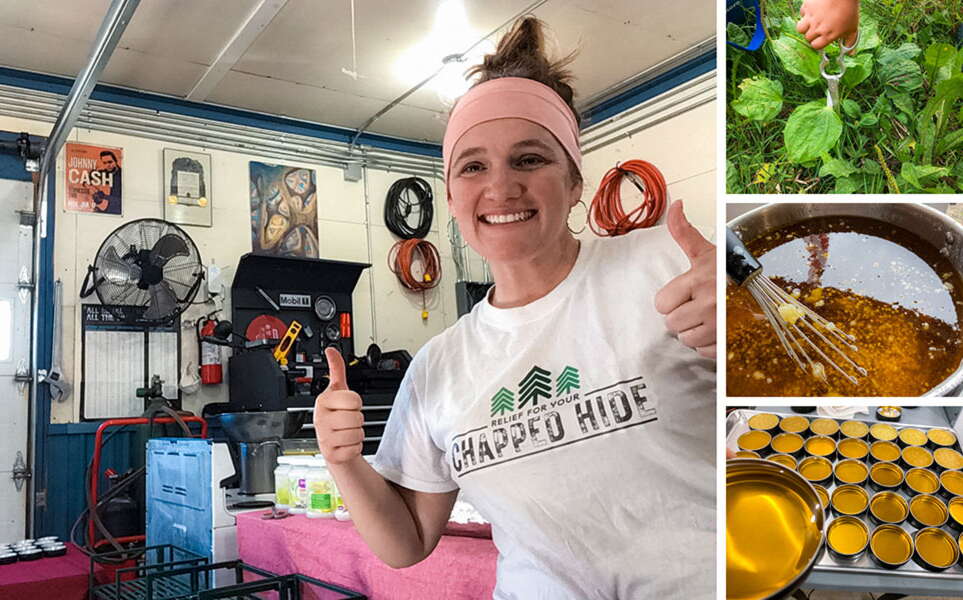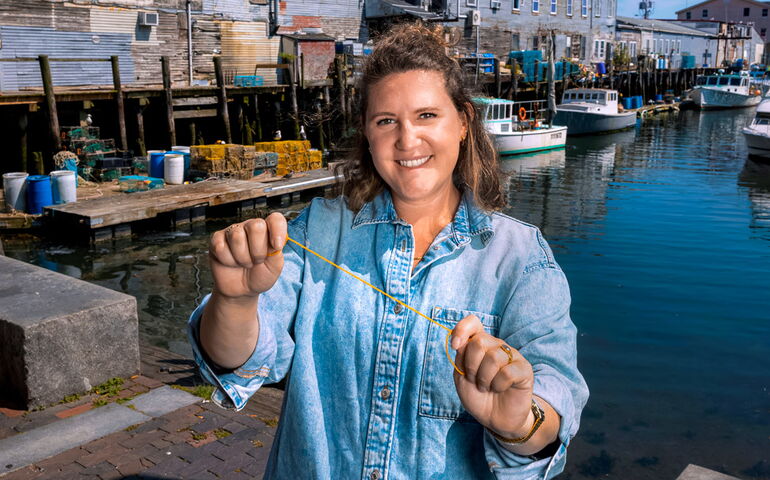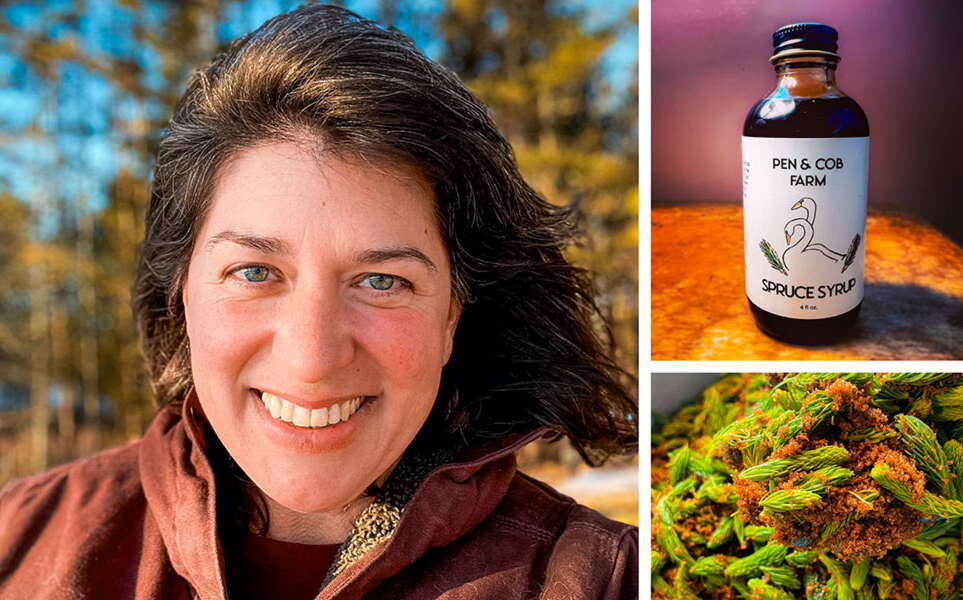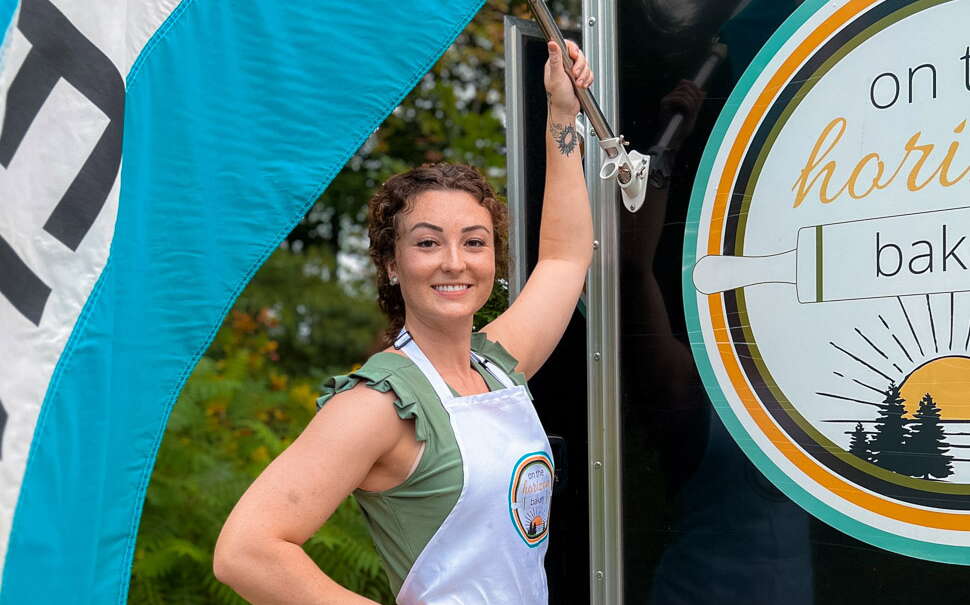
Processing Your Payment
Please do not leave this page until complete. This can take a few moments.
From seaweed twine to plantain salve, young businesses are going all-out on innovation
 Photo / Tim Greenway
Katie Weiler launched Viable Gear in Portland to develop a seaweed-based bioplastic for food harvesters to replace traditional plastic gear. Its pilot product, SeaTwine, is slated to launch in 2025.
Photo / Tim Greenway
Katie Weiler launched Viable Gear in Portland to develop a seaweed-based bioplastic for food harvesters to replace traditional plastic gear. Its pilot product, SeaTwine, is slated to launch in 2025.
The startup ecosytem across Maine is going strong, with dozens of young companies in action.
We caught up with four in various stages of development.
Common themes? It’s about a personal interest or mission, often supported by programs like Top Gun and Dirigo Labs.
A pivot from plastic
Viable Gear in Portland is developing a seaweed-based bioplastic for food harvesters to replace traditional plastic gear.
Its pilot product, SeaTwine, is slated to launch in 2025 for seaweed aquaculture as seed string and for the farming industry as twine used in greenhouses and for baling.
Katie Weiler launched Viable Gear in 2021. “I got into the global plastic crisis and how it was impacting human health and our food systems in 2017 and, by 2019, knew I wanted to pivot from my career in management consulting to doing this work for a living,” she says.
“I wasn’t sure what that was going to look like or how I was going help reduce plastics, but when I started reading about polysaccharides in seaweed and the need for changes in ropes as the endangered species act was coming down hard on our lobster industry, I knew there might be something there that I could help with.”
Weiler has participated in several accelerator programs. Viable Gear has been run on non-dilutive funding from grants to move the company through R&D as it begins to scale. The plan is to launch a pre-seed raise this fall to get the product to market.
“Viable Gear is still pre-revenue until we get a product on the market in 2025 but, over the last three years, we’ve built up a network in the aquaculture and lobster industries to stay close to the industries and people who will be our future customers,” Weiler says. “It feels like there is a good traction for a customer base when we launch.”
SeaTwine tests are planned with Atlantic Sea Farms and Darling Marine Center, both in Maine, and Blue Dot Farm in Washington. A COO hired last fall is building a West Coast presence.
Viable Gear sources brown macroalgae from Ireland and Scotland and works with a pilot production facility in Ireland. Goals include sourcing and processing in Maine.
Further prospects include developing a bait bag for the lobster and crab fisheries; and turning seaweed-based bioplastic into pellets for use in traditional injection molding plastic machinery across multiple industries.
Networking is key.
“The idea of seed string wasn’t even something on my radar until talking with seaweed experts and growers who mentioned the nylon twine they use now and wanting to grow seaweed on seaweed,” she says.
A product born from black fly season
In the Aroostook County town of Cary, Suzanne Hiltz launched Chapped Hide, a salve made from broadleaf plantain, a perennial plant (not the banana), marketed for dry skin, rashes, bug bites and other ailments.
“I first made plantain salve, our flagship product, out of necessity for the black fly bites I accrued during the first planting season in 2014 when we moved to Aroostook County,” she says.
“I gave the leftovers away to friends, family and neighbors. Within a couple of years, I started receiving requests to sell jars of it and even ship it as far away as Florida.”
In 2018, Hiltz transitioned from glass quarter pint mason jars to plastic cosmetic containers. After receiving a business development block grant in 2023, she switched to tin containers that are rugged, recyclable and reusable.

“At the same time I began to push my way into a few local and regional retail locations,” she says. That’s when Chapped Hide launched into a business.
Other ingredients include bees wax, vitamin E and oils known for skin health, in which herbs native to Maine are infused.
Hiltz personally invested $10,000 in the overall business, which includes an Amish-built farm stand, Das NiederHiltz Haus, that sells handcrafted products.
Of that, $5,000 has been for Chapped Hide, along with at least 2,000 unpaid hours over the last three years through R&D, advertising, sales and travel.
“I financed the company’s start-up during the first few years through the small amount of sales I brought in,” she says.
A $10,000 block grant went to scale up the business, including professional branding, packaging, website, trademark, LLC registration, ingredients and merchandise. A second, $25,000 grant project is in process that would increase sales in Maine and beyond.
This year, Hiltz was in the Top Gun business accelerator program. Press has generated buzz for her e-commerce store. Retail, fair and market sales are increasing.
Production is done at Hiltz’s 40-acre homestead, where a workshop is packed with ingredients, inventory, shipping and handling supplies, printers and office supplies.
The plan is to continue to attend shows in Maine and hit the Ultimate Woman’s Expo in Edison, N.J., on Nov. 9-10. “I have a few other shows I want to hit before the grant end date on December 2025,” she says.
Although small-retail and in-person farm stand sales are doing well, a key insight has been that e-commerce outshines everything.
“I am working on our internet exposure at this time,” Hiltz says.
New use for an age-old forest product
Pen & Cob Farm, in the Washington County town of Pembroke, produces dairy, beef, pork, produce and an unusual value-add product — spruce syrup.
Five years ago, Katherine Swann and her family sold their suburban New Jersey home, drove north in an old camper, started farming in 2019 and formalized as a business in January 2021. The first syrup launched in November 2022.
“We were interested in growing our own food,” says Swann. “When we looked at it from a business perspective, we realized we needed to figure out what we were going to do to earn a living.”
They realized they needed to create products that would sell beyond their rural area. And they wanted to make a product from inputs already abundant on their property.
“I stumbled upon foraging websites that talked about how to create spruce syrup,” Swann says. “So I tried it.”
Swann learned there’s a short springtime window for harvesting spruce tips, and learned how to make syrup to see what it tasted like. “It was really good,” she says.
They had to wait a year for the next harvest season, made more syrup, had friends and family taste it and realized it could be profitable.

Swann and her husband had business backgrounds. They devised a business plan and experimented with the amount and type of sugar needed for the syrup, and processing techniques such as macerating, boiling and straining to gain the right potency and consistency.
“It has a citrus flavor and kind of woodsy flavor,” she says, adding that a little drizzle adds a nice kick to a dish.
The product is in about 30 stores in Maine and beyond, and is also sold online and at farmers markets and events.
Within the first week of launching, the first order was a specialty food store in Manhattan.
A goal is to build more of a team in the coming year. A $25,000 domestic trade grant through the Greater Portland Council of Governments went to trade show appearances this year and to hire a social media consultant.
Selling in-person works well because they can provide samples. Social media can educate consumers on the flavors and uses of spruce syrup.
“We’re the only company I know of in the United States that makes this kind of spruce syrup,” she says. “There was an opportunity to bring a new flavor into the marketplace. “
This year’s production will be about 4,000 four-ounce jars, working in the home’s kitchen. Work is underway to convert an outbuilding into a production facility.
The 75-acre property has about 50 acres that can be transitioned into a harvestable spruce forest, which should cover growing demand, says Swann.
“We see spruce as being an untapped specialty crop for Maine,” she says.
That includes providing spruce syrup to other Maine manufacturer to include, for example, in ice cream. This year, a brewery took spruce tips for one of its ales.
Startup investment was minimal. “We started by using things we already had and didn’t have to buy much,” she says.
Sales proceeds are plowed back into the business, and a $5,000 award from Big Gig in Bangor. Swann learned about other programs and grants through Top Gun. A business loan through the Northern Maine Development Commission helped purchase the farm.
“I love figuring out how to do things,” she says.
Veteran-built mobile bakery
After being injured while serving in the U.S. Army, Hailee Carter returned home to Ellsworth, to a desk job and to her love of baking.
Eventually, she bought and outfitted a van and trailer, launching in July 2023 as a mobile operation called On the Horizon Bakery.
Today, Carter has a steady flow of customers at two locations in Ellsworth, plus events, wholesale customers and special orders such as wedding cakes.

Carter pumped earnings from her work at a café and money from the sale of her house into the conversion; she already owned much of the kitchen equipment. Licensing and permits in hand, she secured spots at a Home Depot in Ellsworth’s commercial section and at a retail spot in the downtown area.
The startup was sporadic. While continuing to work at the café, she started one day a week at Home Depot, adding another day later that summer at the downtown location, eventually adding a couple of days along with events and private orders.
“It was a trial by error situation,” she says.
This year, she’s been operating five hours a day, six days a week since June. Products include breads, pastries, desserts breakfast sandwiches and burritos.
Up to 100 customers per day swing by. Additional business includes online orders, events, fairs and several wholesale accounts.
Research and networking helped get the business off the ground, along with the Veterans Administration’s Veteran Readiness and Employment program, which helps veterans with a service-connected disability to explore employment options and address education or training needs, according to its website.
A representative pointed her to the Maine Small Business Development Centers, which offers free small business advising for Maine entrepreneurs.
“I’ve worked with people there over the course of five years,” she says. “They helped me break everything down.”
Carter still connects with her SBDC mentor to discuss ideas for advancing the business.
Financing included a couple of small grants, including $1,000 from the local nonprofit Heart of Ellsworth that toward the purchase of an oven. But mostly the enterprise was paid for out of pocket. Says Carter, “I wanted to fully own my dream.”














0 Comments